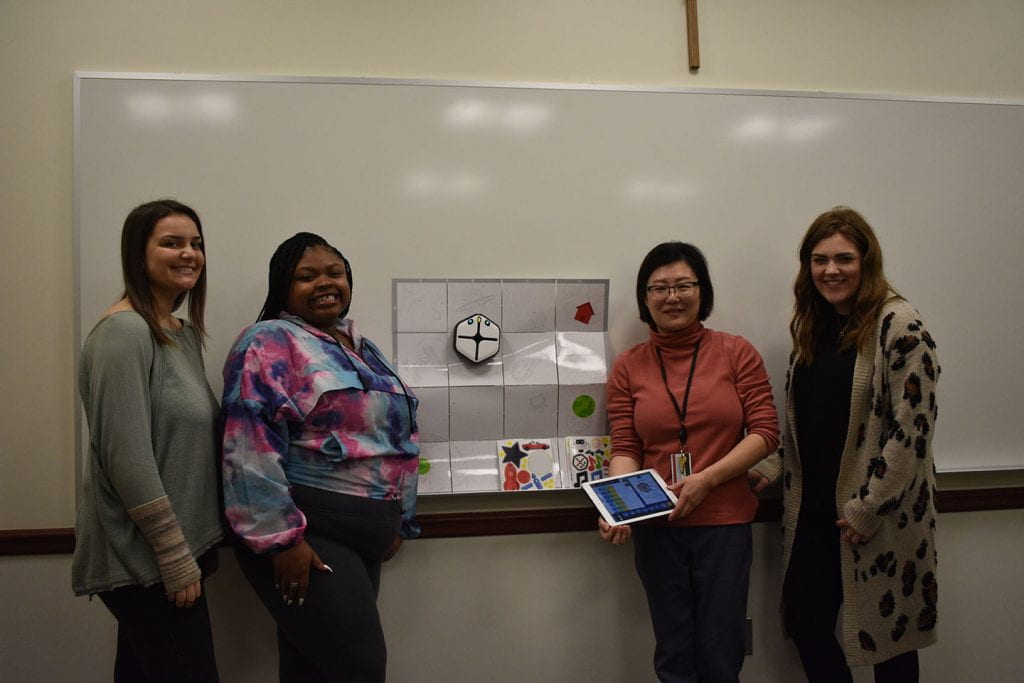SESW Elementary and Special Education Faculty in the Spotlight: Dr. Lin Zhang

What are the primary goals of the EDU 495: Educational Research course?
The goal of this course was to involve students in projects that would allow them to experience research and learn skills to be able to conduct research, in the field of education, on their own and prepare them for graduate school. The course aimed to teach the students, the relationship between research and teaching that they would be engaging in for their future careers. Specifically, students learned the research skills of how to find relevant literature on the topic, how to collect and analyze educational data in school settings, and how to present their findings to the public.
Who are the students involved in this course?
The first students enrolled in this inaugural course held during Spring 2020 were Claire Sullivan, Maya Young, and Emma Hendricks, all rising seniors from the Class of 2021 in the Elementary and Special Education (ESE) major, taught by Dr. Lin Zhang.
What are students studying in EDU 495?
The group studied whether learning how to program a robot can help improve students’ social and emotional skills of individuals with Autism Spectrum Disorders (ASD). The students used technology, specifically the Root robot, to enhance the communication/collaboration skills of children with special needs, specifically those with autism, through social interactions. As a result of their disability, it is difficult for them to communicate and the robot helps students to ask for help in solving problems by making it an enjoyable learning experience. The robots created problems for the kids to solve, to have them realize the need to communicate/collaborate with their peers and teachers to help them solve the problem.
The students also learned research protocols and tools outside of their teaching experiences. Specifically, they are learning educational research-related skills, including but not limited to, getting Institutional Review Board (IRB) approval, conducting literature reviews, learning how to use Inter Library Loan and library resources for research, collecting, analyzing, and transcribing videos, coding, and presentation etiquette. The students have not been exposed to these skills before and this course aims to expose them to some of the different aspects that go into conducting research.
What inspired you to develop a research course for education?
This course was a collaborative effort initiated by ESE faculty members, Drs. Lynne Ryan, Marcy Zipke, and Lin Zhang, to bring educational research experiences to our ESE students to enrich their professional training at Providence College. Lin built this course using framework resources from the Center for Engaged Learning (CEL) department that she tailored for the major of education. She saw the need for students from the education major to be able to have research experience in their own major whereas, before this course, they had to find research opportunities in other majors. Specifically, she remembered one of her students from last year who wanted to gain research experience before attending graduate school. The student ended up doing research in the Psychology department because education did not offer a research course. Since more students from the education department are attending graduate school, she saw the need to create a course for them to learn the necessary skills. Although students can get research experience in similar disciplines, she thought it was important for education to have their own course tailored specifically to the discipline they are majoring in.
Being able to conduct this research has allowed me to gain new perspectives in regard to social and emotional learning.
CLAIRE SULLIVAN ’21 ESE
I am so grateful to have partaken in such an interesting research course. Working with the Root coding robot has given me a different outlook on social and emotional learning and the impact it can have on students. I am thankful to work with a great team and a fun robot.
MAYA YOUNG ’21 ESE
I am so thankful to have had the opportunity to work with Dr. Zhang, Claire, and Maya on this project! Being a part of this team has allowed me to learn the process beyond data collection and how important it is to focus on the little details while analyzing data. I am excited to continue with this project and learn more about how robots impact student social and emotional learning.
EMMA HENDRICKS ’21 ESE





